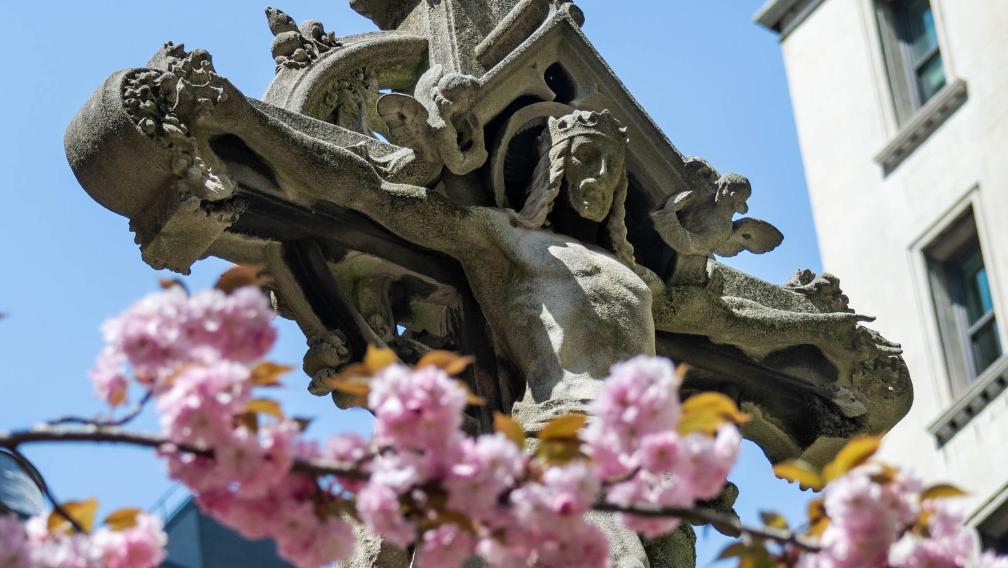Five Ways Into Sunday’s Scripture: Radically Free

The Lord God took the man and put him in the garden of Eden to till it and keep it. And the Lord God commanded the man, “You may freely eat of every tree of the garden; but of the tree of the knowledge of good and evil you shall not eat, for in the day that you eat of it you shall die.”
Genesis 2:15–17
This season of Lent begins in a walled garden. God places humankind in Eden and gives them stewardship over its flourishing. The word Eden likely means delight or abundance, and humans are told to “till and to keep” it — to preserve their home of beauty and fresh life. In this admonition, they are given a true sense of purpose and meaning, and there is a wide range of freedom allotted to them as they take up this task.
They are told that they may “freely eat of every tree of the garden” including, presumably, the Tree of Life — and only one tree is forbidden to them. It is therefore God’s grace-filled extravagance that is emphasized, not God’s stinginess. All the trees in the garden except for one — all the riches of Eden — are theirs to be enjoyed as a gift.
But they are not God, and so these verses also contain a first command. In his commentary on the Book of Genesis, biblical scholar Walter Brueggemann writes, “These three verses together provide a remarkable statement of anthropology. Human beings before God are characterized by vocation, permission, and prohibition. The primary human task is to find a way to hold the three facets of divine purpose together.” Indeed. Humans have God-given limits, in addition to great liberty.
This is a life where prohibition is necessary, and also a life of overabundance. As Jesus says in the Gospel of John, “I am come that they might have life, and that they might have it more abundantly.”
Finding the balance between vocation, permission, and prohibition is part of the “art of being creatures” that Wendell Berry and Ellen Davis speak about below. We are contingent beings, dependent on God’s breath and holding. But we are also, within those confines, radically free.
—Summerlee Staten
THEOLOGY
Wendell Berry and Dr. Ellen Davis, Professor of Hebrew Bible, discuss “The Art of Being Creatures” and how that relates to the story of the Garden of Eden.
VISUAL ART
Artist Stephen Pace imagines an abstract “Before Adam and Eve,” at the Smithsonian American Art Museum.
POETRY
Paul Hoover powerfully reframes the story of the Garden of Eden.
SOCIAL JUSTICE
The story of Eve in Genesis is more complex than you might think.
MUSIC
Natalie Merchant’s beautiful song “Eden” reminds us of the artistic history of this narrative with these wondrous lyrics:
And in that time kind words
Alone will teach us,
No bitterness will reach us.
Reason will be guided another way.
All in time,
But the clock is another demon that
Devours our time in Eden,
In our paradise.
Will our eyes see well beneath us,
Flowers all divine?
Is there still time?
If we wake and discover
In life a precious love,
Will that waking become more heavenly?
Coming Soon
This Sunday at 10am, the Discovery community embarks on a new series: Unity, Forgiveness, and Talking Across Difference. How do we resolve conflict and act as one body when we’re so different from one another? The Rev. Dr. Mark Bozzuti-Jones shares A Forgiveness Toolkit.
How have African Americans throughout history utilized the Apostle Paul and his letters in their writings to protest and resist oppression? On May 5–7, join Dr. Lisa Bowens at Trinity Retreat Center for African American Readings of St. Paul, an opportunity to journey through the centuries by engaging select portions of works by Black authors who lived from the 18th to the 20th century.





